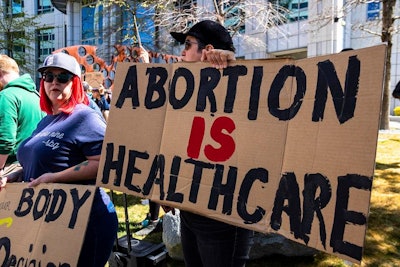
“It’s incredibly disappointing to see the Supreme Court make a decision that is so out-of-step with mainstream America’s realities,” said Dr. Michael J. Sorrell, president of Paul Quinn College, a private HBCU in Texas. “We are charged with educating and preparing students to be capable of navigating any reality that they find themselves in. Sadly, the political motivation behind many decisions in this country run contrary to the majority of people’s interests and demonstrated desires. And so, we have to teach students to navigate through that.”
In September 2021, Texas became ground zero for the country’s abortion battles. A state law known as SB 8 went into effect at that time, banning the termination of pregnancies after around six weeks. When the Supreme Court in June ruled to overturn Roe in Dobbs v. Jackson Women’s Health, several conservative-controlled state legislatures quickly passed Texas-like abortion laws or near-total bans on ending pregnancies.
Many HBCUs are in states now with abortion bans. Studies also show that women of color disproportionately seek out most abortions in the U.S., often for economic reasons. An array of research has additionally found that being denied an abortion can limit a woman’s educational opportunities.
“While HBCUs are highly concentrated in regions of the U.S. that will most likely limit access to reproductive services, HBCU college health providers are well versed in providing excellent care to students with limited resources,” wrote Dr. Tondra L. Moore, executive director of health services at Prairie View A&M University, a public HBCU in Texas, via email to Diverse. “As with any medical situation encountered, HBCU college health providers will continue to provide services aligned with applicable laws and regulations as well as the mission of their respective institutions.”
At Jackson State University (JSU), a public HBCU in Mississippi, Dr. Samuel Jones, director of health services there, said that the Supreme Court’s decision “has not impacted the services offered at Jackson State University.” The health center provides JSU students with free contraceptives and contraceptive counseling. And the center “will continue to refer students who require prenatal care to local OBGYN clinics if they do not have access to their own private physicians.”
But for pregnant people in Mississippi who seek abortions, there is no abortion clinic in the state that JSU could refer students to, should they ask. Questions remain in such states around what role universities play to support students’ reproductive health care to continue their educations.
“Our ultimate goal is to educate our students to make the best decisions for their personal health,” added Moore. “Therefore, we will bolster our health education and promotion activities that currently exist to help students make the best decisions possible.”
At Meharry Medical College, a private HBCU in Tennessee, Dr. Edward Hills spoke about the impact of the Dobbs decision on educating the next generation of doctors. Hills is a professor in Meharry’s department of obstetrics and gynecology. Many of his patients are women of color from low-income communities.
“Being at a predominantly minority-serving institution as well as being an OBGYN, we are very concerned about this particular Dobbs decision, and we are in the process of accommodating what we think is to come,” said Hills on educating graduate students. “We intend to continue, of course, teaching what a medical doctor needs to know, both with the managing of spontaneous miscarriages as well as induced miscarriages, or what may now be called an abortion in some jurisdictions.”
Tennessee has already outlawed abortions after around six weeks of pregnancy, similar to the SB 8 law in Texas. A near-total abortion ban in Tennessee is soon to be enacted due to a trigger law that Roe’s overturning put in motion.
“I think the guiding principle is that we are still doctors,” said Hills. “And our patients are still our patients, and so we have to serve them as completely as we can given the legal constraints.”
For teaching reproductive health care, Hills noted that “things get more dicey” when it comes to post-graduate medical students in states with abortion bans or severe restrictions. The Accreditation Council for Graduate Medical Education (ACGME) released guidelines for teaching obstetrics and gynecology under such constraints.
“They have said that in those states in which abortion is illegal, we need to send students to states where it is legal so that they can get the training they need to learn how to perform and manage abortion, which is quite an ask,” said Hills, who added that ACGME said abortion simulations could also be allowed to train post-graduate students who are unable to travel.
The Dobbs decision has additionally raised confusion among many in the medical community around the legality of assisted reproductive technology, such as in vitro fertilization (IVF).
“Students need to learn about the technology needed to assist women in getting pregnant, and that sometimes involves developing embryos outside of the body,” explained Hills. “There will be issues around what you do about the remaining embryos. And what about surrogate parenting? We have to cover these areas academically.”
Reflecting on the bigger picture, Sorrell at Paul Quinn also noted that the Dobbs ruling came on the heels of a school shooting in Uvalde, Texas, killing 19 children and two teachers. Setbacks around abortion rights as well as gun control have left him wondering about the role of universities at this time in the country.
“I think we in higher education have to ask ourselves some really fundamental questions,” said Sorrell. “I say this time and time again: all the people who are involved in this state of affairs right now—those on the Supreme Court, for example–they all went to American colleges and universities. The partisanship behavior. The unwillingness to collaborate or to reach across party lines. What have we done as institutions to contribute to this landscape? Because we have to take ownership of this. There is something we are doing wrong.”
Rebecca Kelliher can be reached at [email protected].
















